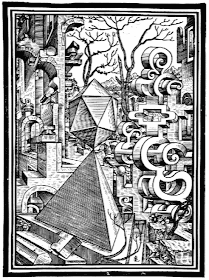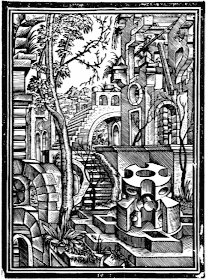First of all, it may be true that much traditional fantasy does tend to reinforce traditional social structures. The bad usurping king must be replaced by the rightful king, the princess must be rescued from her life as a servant, and the will of the gods is inexorable fate against which mortals struggle in vain. And perhaps sci fi has been more likely to show us progress, or the view that the future is in our hands. But I don’t think that correlation is anything intrinsic or necessary to the two genres, but rather a side effect of fantasy’s long history and sci fi’s more recent invention as a genre during the same time that industrialization and social movements began turning people’s thoughts to progress. Whatever the reason, I don’t think fantasy is necessarily upholding the status quo or sci fi necessarily advocating social change. For my own definitions of the difference between sci fi and fantasy, you can read my blog post The Borders of Fantasy, but the summary is that I think sci fi explores the impact or implications of technology (so yes, the possibility if some kind of change is involved, but not necessarily change to the social order), while fantasy uses its magic as part of the framework of the world in which characters must act. Both ask that vital question “What if?” but sci fi tends to ask it about questions of technology or specific changes to society brought about by inventions or discoveries, while fantasy tends to ask “What if” about more fundamental or personal issues such as good vs evil and the hero’s quest. So I agree that Pratchett could be considered a sci fi writer, but that’s because in many of his books, such as his most recent Raising Steam, he deals quite specifically with issues of technological change. But I’m getting back to a discussion of words and definitions again. What I completely agree with in Brin’s article is that some fiction tends to give the moral lesson that the status quo must be defended or is so natural or preordained that it will always stand, while other fiction explores whether,
why, or how we might change our universe. I can see Brin’s point that we should be wary of those stories that tell us the status quo is sacred or inevitable. A steady diet of that could well seep into our subconscious and become unhealthy just as a steady diet of violent “solutions” tends to make us believe that violence is a plausible solution in real life. We certainly need to see examples of change, and that is indeed one of the important roles that speculative fiction needs to play if it’s going to make the world a better place.
When I examine my own favorite stories I come to the conclusion that I tend to believe the author’s assurance of what our heroes’ goal should be. If Tolkien tells me Aragorn should be king, I believe him, rather than wondering why the hobbits don’t start protesting for democracy. Now, if Aragorn acted just like Sauron, I wouldn’t be able to take Tolkien’s word for it that he’s the Good Guy, which is why I found Philip Pullman’s “His Dark Materials” series unacceptable - I was being asked to take the goodness of the “Good Guys” on faith despite all evidence to the contrary. But as long as the goal does indeed appear to be a noble one, I’m willing to accept it within the story, even if it doesn’t look like my view of what an actual modern society in the real world ought to look like. This is because the part that interests me tends to be the How. How do you solve the problem? How do you implement the solution? How do you find the courage, the strength, the creativity to overcome the obstacles? So I love many a story, including The Lord of the Rings, that David Brin would label “fantasy” and say is standing against the idea of human improvability. I would argue that many stories in which the happy ending involves lack of fundamental social change may still be about human improvability and progress, because they explore an individual’s ability for personal change and progress. However, I do think Brin’s point that some stories presume changelessness while others embrace change is an excellent one, and one that I hadn’t really considered before. Think about the books you like. Think about what underlying messages they might be offering. Think about how your favorite stories might be helping to make the world a better place - or might be encouraging us to hold back from progress.
[Pictures: 2. Landscape with ruins, tetrahedron, and icosahedron;
10. Landscape with ruins and cylinder segments, wood block prints from Geometria et Perspectiva by Lorenz Stör, 1567 (Images from TU.)]



No comments:
Post a Comment
I love to hear from you, but please no spam, ads, hateful language, or other abuse of this community.